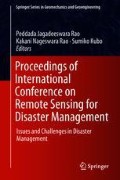Abstract
The primary goal of Cartosat-1 mission is to generate, archive and disseminate seamless Digital Elevation Model (DEM) to facilitate the Remote sensing users and cartographers. The production approach identified for generating CartoDEM is through processing based on Ground Control Points (GCPs) using Augmented Stereo Strip Triangulation (ASST) software system. DPGS-NRSC has generated and disseminated 10 m CartoDEM covering India and surrounding countries, part of south- west Asia and in the process of generating DEM covering Australia. 30 m DEM is ported on Indian EO portal Bhuvan for visualization and free download. To explore the improved performance of the DEM, we carried out comparative quality analysis of CartoDEM data with 2.5, 5 and 10 m resolutions generated in operational mode. This study has confirmed the enhanced performance of 2.5 m CartoDEM in terms of hydrological, terrain category and contour analysis. This geospatial input is one of the decision making tools for understanding spatio-temporal variations and better management.
Access this chapter
Tax calculation will be finalised at checkout
Purchases are for personal use only
References
Burrough, P.A., McDonnell, R.A.: Principles of geographical information systems, pp. 333–335. Oxford University Press, New York (1998)
Kim, S., Kang, S.: Automatic generation of a SPOT DEM: Towards coastal disaster monitoring. Korean J Remote Sens. 17, 121–129 (2001)
Pike, R.J., Evans, I.S., Hengl, T.: Geomorphometry: A brief guide
Srivastava, P.K., Srinivasan, T.P., Gupta, A., Singh, S., Nain, J.S., Amitabh, Prakash, S., Kartikeyan, B., Krishna, B.G.: Recent advances in Cartosat-1 data processing. ISPRS Hannover Workshop (2007)
Acknowledgements
The authors would like to place on record their deep gratitude for the support provided by Dr. Y. V. N. Krishnamurthy, Director, NRSC for the successful completion of this work. The authors deeply acknowledge the support provided by CartoDEM generation team.
Author information
Authors and Affiliations
Corresponding author
Editor information
Editors and Affiliations
Rights and permissions
Copyright information
© 2019 Springer International Publishing AG, part of Springer Nature
About this paper
Cite this paper
Venkateswarlu, E., Raghuramulu, I., Sivannarayana, T., Swamy, G.P., Gopala Krishna, B. (2019). Quality Evaluation of CartoDEM in Different Resolutions. In: Rao, P., Rao, K., Kubo, S. (eds) Proceedings of International Conference on Remote Sensing for Disaster Management. Springer Series in Geomechanics and Geoengineering. Springer, Cham. https://doi.org/10.1007/978-3-319-77276-9_8
Download citation
DOI: https://doi.org/10.1007/978-3-319-77276-9_8
Published:
Publisher Name: Springer, Cham
Print ISBN: 978-3-319-77275-2
Online ISBN: 978-3-319-77276-9
eBook Packages: EngineeringEngineering (R0)

